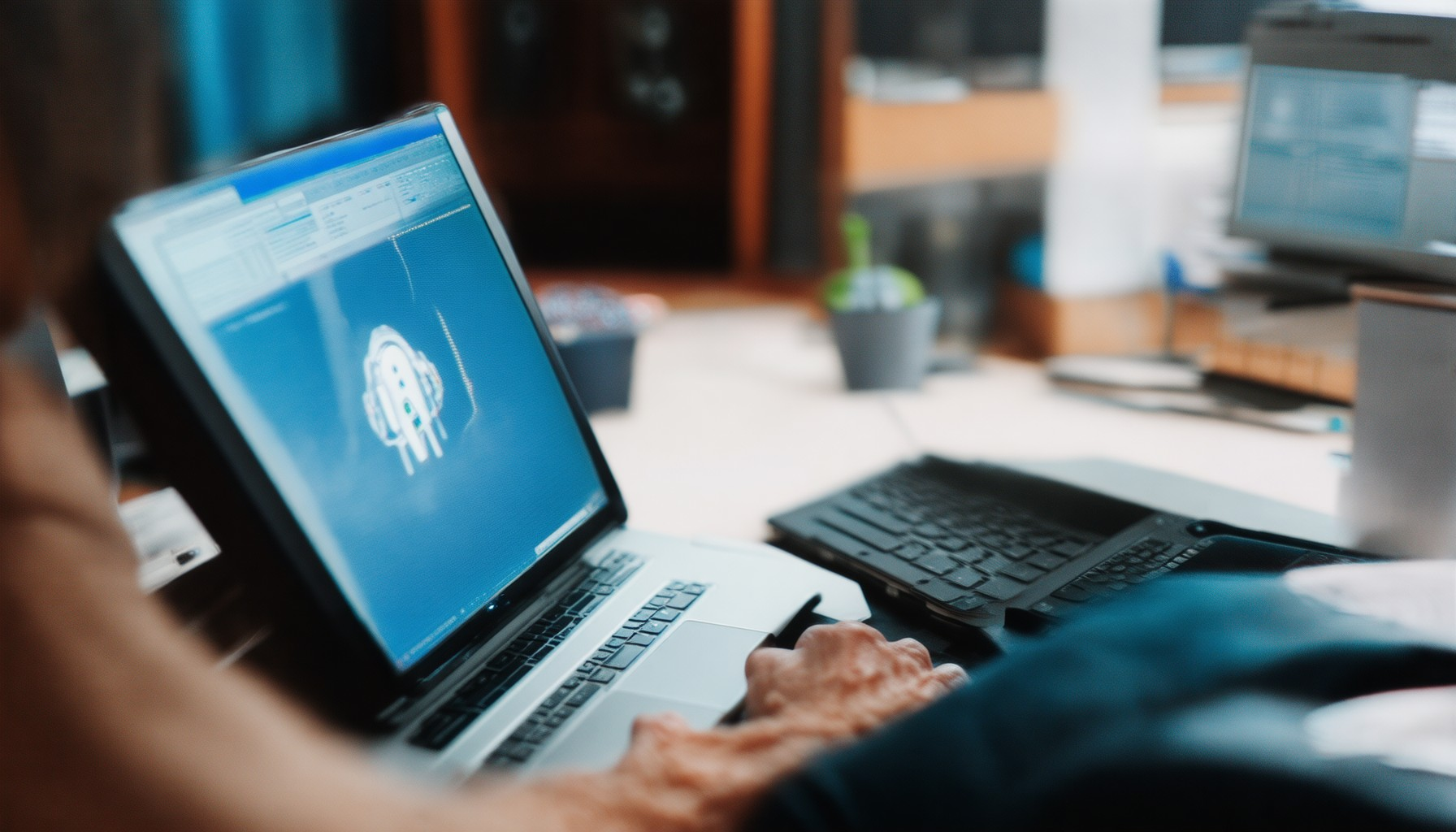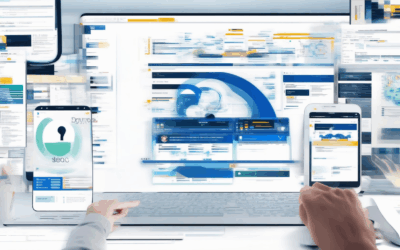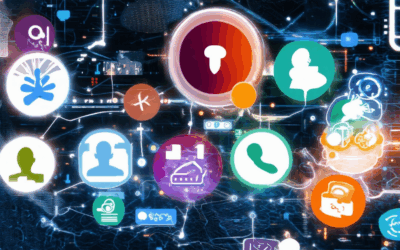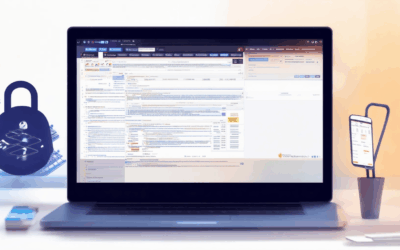In today’s interconnected world, internet security has become a cornerstone of modern life. With billions of people accessing the web daily for everything from work to leisure, protecting your online presence has never been more critical. Whether it’s safeguarding sensitive personal information, preventing identity theft, or shielding against financial fraud, the stakes are high. This article dives into the essential steps individuals can take to bolster their internet security, offering actionable insights and strategies to stay protected in an increasingly digital world. From understanding the basics of cybersecurity to implementing robust practices, we’ll explore how you can fortify your defenses against cyber threats. By equipping yourself with knowledge and tools, you can navigate the online landscape with confidence and peace of mind.
Key Takeaways
– Use Strong, Unique Passwords: Protect your accounts with complex, unique passwords and consider a password manager for better security.
– Enable Two-Factor Authentication (2FA): Add an extra layer of security with 2FA for your critical accounts.
– Regularly Update Software: Keep your OS, apps, and browsers updated to patch security vulnerabilities.
– Be Cautious with Public Wi-Fi: Avoid sensitive transactions on public networks; use a VPN for added protection.
– Encrypt Your Data: Secure your information with HTTPS and consider using a VPN for safe browsing.
– Backup Your Data: Regularly back up important files to prevent data loss and enhance security.
– Stay Informed About Cyber Threats: Stay ahead of threats like phishing and ransomware through reliable sources.
– Use a VPN: Enhance online privacy with a VPN to mask your IP and encrypt your traffic.
– Disable Unused Features: Turn off unnecessary features on your devices to reduce potential attack vectors.
– Educate Yourself and Others: Spread awareness about cybersecurity to stay protected and informed.
By following these steps, you can significantly boost your internet security and protect your personal data online.

What Are the Best Internet Security Tips for Individuals?
Here’s a comprehensive guide to staying safe online:
- Use Strong Passwords : Create complex passwords with a mix of letters, numbers, and symbols. Avoid reusing passwords across multiple accounts.
- Enable Two-Factor Authentication (2FA) : Add an extra layer of security to your accounts by enabling 2FA. This prevents unauthorized access even if someone knows your password.
- Keep Software Updated : Regularly update your operating system, apps, and browsers to patch security vulnerabilities that could expose your device to threats.
- Be Cautious with Public Wi-Fi : Avoid sensitive transactions on public networks. Use a VPN for added protection when connecting to unknown Wi-Fi hotspots.
- Encrypt Your Data : Use end-to-end encryption for emails, messaging apps, and files stored online to ensure only authorized parties can access them.
- Stay Alert for Phishing Attacks : Recognize suspicious emails, messages, or links and verify the sender before interacting. Phishing is a common method for stealing credentials.
- Clean Up Your Browser History : Periodically delete cookies, cache, and history to reduce the risk of tracking and unauthorized access.
- Secure Your Accounts : Enable multi-factor authentication (MFA) wherever possible and regularly check for account activity to spot unauthorized logins.
- Backup Your Data : Regularly back up important files to an external drive or cloud storage to restore them if your devices are compromised.
- Stay Informed About Threats : Keep track of the latest cyber threats and learn how to protect yourself. Knowledge is your first line of defense against attacks.
For more detailed guidance, visit BlindBrowser.com to explore their comprehensive security resources and tools tailored for individuals.
Protecting Yourself Online: Essential Steps for Digital Safety
We all live in a connected world where online protection is crucial. Here’s how you can safeguard yourself:
- Strong Passwords:** We recommend using complex combinations of letters, numbers, and symbols. Avoid reusing passwords across multiple accounts.
- Two-Factor Authentication:** Enable 2FA for added security. This adds an extra layer of protection beyond just your password.
- Regular Software Updates:** Keep your devices updated to patch vulnerabilities. This is especially important for browsers and operating systems.
- Avoid Suspicious Links:** Be cautious with links from unknown sources. Hover over them to check the URL before clicking.
- Keep Personal Information Private:** Refrain from sharing sensitive details like addresses or phone numbers online unless it’s necessary and secure.
Stay Informed with Resources from BlindBrowser
BlindBrowser offers comprehensive guides and tools to help you stay protected online. Explore our resources for:
- Online Privacy Tips
- Password Management Best Practices
- Top Security Tools and Software
- Managing Your Digital Footprint
By following these steps and utilizing our resources, you can enhance your online security and enjoy a safer browsing experience. Remember, staying informed and proactive is key to protecting yourself online.

What are the best internet security practices for individuals?
Here are the best internet security practices for individuals, organized into a clear and structured format:
- Use Strong Passwords : Create complex passwords with a mix of letters, numbers, and symbols. Consider using a password manager to store and manage them securely.
- Enable Two-Factor Authentication (2FA) : Protect your accounts with an additional layer of security by enabling 2FA, often referred to as 2-step verification.
- Regularly Update Software : Keep all software, applications, and operating systems updated to patch vulnerabilities and enhance security.
- Encrypt Your Data : Use encryption for sensitive information stored on devices or shared via public networks. Enable encryption for external drives and backups.
- Avoid Suspicious Links : Do not click on unknown or unsolicited links, especially from emails or messages. Hover over links to see the full URL before clicking.
- Install Antivirus Software : Use reputable antivirus or antimalware software to detect and remove malicious programs from your devices.
- Be Cautious on Public Wi-Fi : Limit personal information sharing on public Wi-Fi and consider using a VPN for added protection.
- Manage Email Accounts : Use unique and strong passwords for each account and enable two-factor authentication where possible.
- Educate Yourself About Phishing : Stay informed about common phishing tactics and verify the authenticity of emails, messages, or websites before interacting.
- Back Up Your Data : Regularly back up important files to an external drive or cloud storage to prevent data loss from cyberattacks.
- Use Privacy Tools : Explore tools and services like BlindBrowser to enhance your online privacy and security.
- Stay Updated on Cyber Threats : Keep track of the latest cybersecurity threats and trends through reliable sources and official communications from organizations like CISA .
By following these practices, you can significantly reduce your risk of falling victim to cyberattacks and enhance your overall online security.
Learn more about secure browsing practices .

Best Internet Security Steps for Individuals
Protecting your data online requires a combination of awareness, vigilance, and proactive measures. Here are the essential steps to safeguard your information:
- Use Strong, Unique Passwords:** Every account you create must have a unique password. Avoid reusing passwords from other accounts and consider using a password manager to keep track of them securely.
- Enable Two-Factor Authentication (2FA):** Add an extra layer of security by enabling 2FA for your critical accounts. This typically involves receiving a verification code via SMS or an authenticator app.
- Regularly Update Software:** Keep all your software applications, including operating systems and browsers, up to date. Outdated software often contains vulnerabilities that hackers can exploit.
- Be Cautious with Public Wi-Fi:** Avoid sensitive transactions or entering personal information when connected to public Wi-Fi. Use a VPN for added protection when accessing vulnerable networks.
- Encrypt Your Data:** Use encryption for important files and communications. Look for the “https” prefix in URLs and verify that data is encrypted before sending it.
- Backup Your Data:** Regularly back up your important files to an external drive or cloud storage. This ensures you can recover lost data in case of a breach or accident.
- Stay Informed About Cyber Threats:** Keep yourself updated on the latest cybersecurity threats and trends through reputable sources. Being aware of common attacks like phishing and ransomware can help you avoid falling victim.
- Use a VPN:** A Virtual Private Network (VPN) adds an extra layer of privacy when browsing online, particularly on public networks. It masks your IP address and encrypts your internet traffic.
- Disable Unused Features:** Turn off unnecessary features like location services or automatic downloads on your devices to reduce potential attack vectors.
- Educate Yourself and Others:** Share cybersecurity knowledge with friends and family. Awareness is the first line of defense against online threats.
By following these steps, you can significantly reduce your risk of exposure to cyber threats and protect your personal information online.
Essential Steps for Protecting Your Internet Security
Securing your internet presence requires a combination of awareness, proactive measures, and ongoing vigilance. Here’s a breakdown of the most critical steps:
1. Use Strong Passwords
Create complex passwords with a mix of letters, numbers, and symbols. Avoid reusing passwords across multiple accounts. Consider using a password manager to store and organize them securely.
2. Enable Two-Factor Authentication
Two-factor authentication (2FA) adds an extra layer of security by requiring a second form of verification, often via a mobile device or authenticator app. This significantly reduces the risk of unauthorized access.
3. Keep Software Updated
Regularly update your operating systems, applications, and browsers. Manufacturers frequently release updates to patch security vulnerabilities that could be exploited by hackers.
4. Utilize Security Tools
Install reputable antivirus, antimalware, and firewall software. These tools help detect and block malicious activities, safeguarding your data from threats like phishing, ransomware, and spyware.
5. Encrypt Your Devices
Encrypt sensitive data stored on your devices using strong encryption methods. This ensures that even if your device is lost or stolen, your information remains inaccessible to unauthorized parties.
6. Manage Online Accounts Responsibly
Use unique usernames and strong passwords for every account. Enable account alerts for changes or login attempts to monitor your activity closely.
7. Avoid Suspicious Links and Downloads
Be cautious when clicking on links or downloading files from unknown sources. Hover over links to see the destination URL before clicking, and verify the source’s credibility.
8. Monitor Network Traffic
Use a VPN (Virtual Private Network) to encrypt your internet connection, especially on public Wi-Fi. This prevents third parties from accessing your data.
9. Stay Informed About Cyber Threats
Keep track of the latest cybersecurity threats and trends through reliable sources. Educate yourself and your family about common attack methods and prevention strategies.
10. Regularly Back Up Your Data
Create regular backups of important files to restore them in case of data loss due to malware or accidental deletion. Store backups in secure locations or use cloud storage with encryption.
By following these steps, you can significantly enhance your internet security and protect your personal information from potential threats. Remember, staying vigilant and informed is your best defense against cyber risks.

Essential Steps for Protecting Your Internet Security
Protecting your internet security is crucial in today’s digital world. Here are the key steps to safeguard your online presence:
- 1. Use Strong Passwords:** Create complex passwords with a mix of letters, numbers, and symbols. Avoid reusing passwords across multiple accounts.
- 2. Enable Two-Factor Authentication (2FA):** Add an extra layer of security by using authenticator apps or SMS codes for account verification.
- 3. Keep Software Updated:** Regularly update your operating systems, applications, and devices to patch security vulnerabilities.
- 4. Be Cautious with Public Wi-Fi:** Avoid sensitive transactions on public networks; use a VPN for added protection.
- 5. Encrypt Your Data:** Use HTTPS for websites and consider a VPN for secure browsing.
- 6. Install Antivirus Software:** Protect your devices from malware and phishing attempts with reliable security software.
- 7. Stay Alert for Phishing Attacks:** Be cautious of suspicious emails, messages, or links and verify the source before clicking.
- 8. Use Private Browsing for Sensitive Activities:** While it doesn’t replace full security measures, private browsing can help protect your data from being tracked.
- 9. Secure Your Accounts:** Use unique passwords for every account and enable multi-factor authentication (MFA) wherever possible.
- 10. Backup Your Data Regularly:** Store important files and data securely, whether on the cloud or external drives, to prevent data loss.
For additional tools and resources, consider exploring platforms like BlindBrowser , which offer comprehensive guides and tools tailored for online privacy and security.
Conclusion: By following these steps, you can significantly enhance your internet security and protect your personal information from potential threats.




